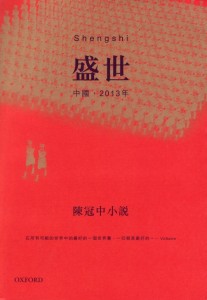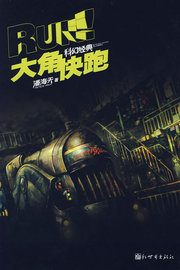Note: An earlier version of this translation was originally published on ZHWJ in April 2004.
Alai, the author of Tibetan-themed fiction such as Red Poppies and a Chinese-language adaptation of the epic of King Gesar, served as editor of Science Fiction World from 1997 through 2006. During that time he helped the agency launch a number of new titles, including Fantasy World.
The following is a translation of Alai’s introduction to the inaugural issue of Fantasy World, April 2004:
Fantasy, Leading Our Spirits to Break Free
by Alai
Taking up my pen to write a few words for this new fantasy edition — actually, two issues have already been sent out into the world to a welcome from young readers far exceeding our expectations — when I searched for a reason, I found I was unable to collect my thoughts. The words of a Whitman poem echoed in my mind:
WHAT place is besieged, and vainly tries to raise the siege?
Lo! I send to that place a commander, swift, brave, immortal;
And with him horse and foot—and parks of artillery,
And artillery-men, the deadliest that ever fired gun.
A short poem, entitled “What Place is Besieged?” The sharp reader may inquire: Are you certain, then, that we are someplace that is besieged? My answer: At least within the confines of literature, our thoughts and our imagination have been bound for ages in shapeless fetters, several generations at the very least.
This is a short period of time when measured against history, and against the scale of the universe, it barely rates as an instant. But we are not God, we are only the creators of our own physical and spiritual realities, and to us a few generations is an eternity. Our lifespan is incomparably precious to us, so aside from a rich variety of material things, we also pursue a free spirit and abundant emotions. But in the literary world, we are surrounded by a mistaken realist outlook and a mistaken interpretation of that mistaken realist outlook. Our abundant emotions have withered, and our spirits that once danced upon the clouds have had their wings clipped, leaving them to crawl around in the mud.
Yes, this is the result of being surrounded, of being fettered. For an individual, the feeling of being surrounded and fettered may lead to an intense ferocity. I have in mind another poet, Rilke, whose poem about a caged panther described the feeling of being bound by the fetters of normal human existence.
My spiritual adolescence occurred during the 1980s. Beginning in that era, the spirit of the Chinese people began to break out in earnest. Chinese literature was similarly an important advance force in this sortie, Whitman’s “horse and foot” and at times even the “artillery-men, the deadliest that ever fired gun.” I had the privilege of being a member of this break-away unit, at first in the ranks of poetry and fiction in the camp of so-called mainstream literature, and then later on, given the opportunity to join a new unit which was just beginning to recruit members for its ranks, I became part of the new literary army of science fiction, which had been harded through adversity. During the 1990s, under the gradual flourishing of the market economy, science fiction became one important success for the spiritual siege-breaking of Chinese literature, despite the fact that it had yet to fully convince the academy of its importance, or even gain the notice of the mainstream. This may indicate that the breakout has yet to be entirely successful.
Dismissing the importance of fantastic literature is a major failing of the overall structure and organization of Chinese literature. The language of the mainstream — of official literature — does not even possess the proper vocabulary to describe the appearance and flavor of this kind of writing. Of course, this failure has nothing to do with us. All we can do is to construct an advance base in silent preparation for the muster of this new literary army. In the 1990s, when the forces of the science fiction world were yet muted, we unequivocally held high the flag of science fiction, achieving small yet solid victories. Today, while science fiction is still neglected among the lethargic upper echelons of the establishment, the surpassing beauty of fantasy is overflowing in all directions, infiltrating and expanding across the literary map, and a new, increasingly grand, increasingly vibrant army is marching under glorious colors. And this army is growing without the command or support of any institution or authority, just like the spontaneous militias in the New World of Whitman’s time. Yet unlike Whitman, they do not even ask the question, “will we ‘vainly try to raise the siege?’” but have already set off.
Discipline improves by the day, the unit gets stronger, and the battlefield expands. Ask “What place is besieged?” and the answer is, our spiritual world is besieged. Distortions of the truth form a hedge around our imagination. A single realm of artistic production has become the entire domain of literature. Creativity and imagination are shut up in a plaza filled with the din of mediocre sociology. Now we must choose another route of escape; at the start of the 21st century, we are starting to recruit a new literary army. To break out of the confines of mediocre literature, this army seeks “horse and foot,” and the “artillery-men, the deadliest that ever fired gun,” whose weapons are creativity and fantasy.
This army believes that literature, and especially fiction, is writing that expresses possibilities. Real life and established history only express a single possibility; all of the others vanish once one possibility becomes actuality. To make up for this shortcoming, our predecessors invented fictional writing. But too often we have made use of this style of writing to describe nothing more than a single possibility, that of real life.
This army believes that there are far more ways to express life than simply copying reality. We can harness writing, in concert with boundless imagination, to construct the possibilities of spiritual reality. This is our starting position, and we set off to realize those possibilities.
As we set off to realize these new literary possibilities, this army believes that they have been successfully realized by foreigners and our own ancestors alike. In the past we may have raised the banner of science fiction and stressed its implications for scientific enlightenment, but now, as we assemble to move out, we emphasize the magnificence of the fantastic, for fantasy has been besieged for too long a time. As we being our journey, we seek this as our goal: through great imagination, construct a grand history, then use that history to describe lives which transcend reality. This is rallying cry of the dynamic Novoland writers group, and it is also the individual watchword of Qian Lifang, the author of Providence.
The first charge has already reported victory!
Since ancient times, fantasy has always held reality within it, not the other way around. Throughout the ages, China has had a bright tradition of fantastic literature, as Borges noted in his remarks on the classic Strange Tales from Liaozhai: “A powerful imagination, using the most common source material, effortlessly weaves a plot; its rhythm undulates like flowing water, its thousand guises like floating clouds.” Such things are precisely what today’s literature is missing in its current state! So this army believes that imagination and fantasy can not only help us break out of this literary predicament, but can also continue the splendid fantasy tradition of Chinese culture. Let all of our readers, writers, and editors encourage each other! To all of the existing participants, those about to join, and everyone who will join in the future: let us look toward the future and strive together! In this new century, the Chinese people cannot and will not continue be slaves to dogma, overcautiously meeting the world.








